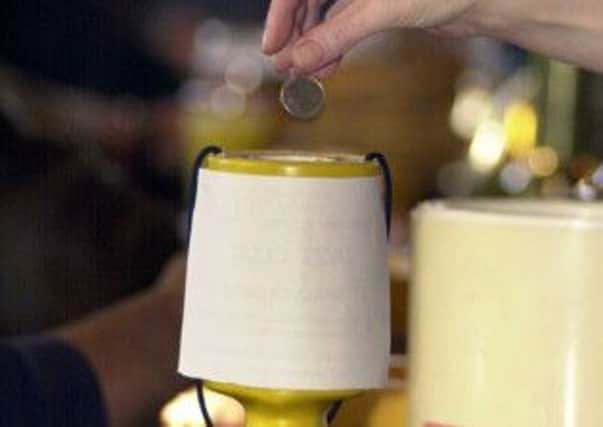Charity bosses ‘worried about independence impact’


• Scots charity bosses ‘more negative than positive’ on independence
• Majority of respondents to Institute of Fundraising Scotland survey thought there would be impact
• Charities told to discuss possible ramifications
Advertisement
Hide AdAdvertisement
Hide AdA report by the Institute of Fundraising (IOF) Scotland found that almost half of the nation’s big charities expect their income to drop if Scotland leaves the UK.
Although the charities, which raise more than half a billion a year in Scotland, do not anticipate local fundraising to be adversely affected, they have concerns that cash from UK-wide trusts and companies could dry up if Scotland goes it alone.
The institute, whose members include Cancer Research UK, Barnardo’s, Age UK, the Samaritans, Save the Children, Shelter and the Scottish Cot Death Trust, is now to look into ways to address these concerns.
The report from the institute, the representative body for fundraisers and fundraising in Scotland, finds overall income to the sector is expected to drop after independence in the opinion of almost half (44 per cent) of respondents.
A third (36 per cent) did not know what the impact of independence would be on their fundraising. Only a small proportion (15 per cent) believed that donations to charities would improve.
The response from UK-wide charities on the impact of independence was more negative than those based north of the Border, the report found.
Generally, charities were more able to single out drawbacks with independence than advantages, according to the report, with 74 per cent identifying downsides, compared with 56 per cent who saw potential benefits. The “most striking” theme which emerged, according to the institute, was a concern about funding from UK-wide trusts and foundations, with 22 per cent identifying this as a problem and an additional 5 per cent pointing to similar concerns around UK-wide corporate and company support.
A small proportion identified a potentially poorer economy (9 per cent), less public money (8 per cent) and general drops in income (6 per cent). This suggested a “theme of concerns” about the economic health of Scotland post-independence, according to the report.
Advertisement
Hide AdAdvertisement
Hide AdFor many, however, the impact of independence in the sector does appear negligible and views are “mixed” on the pros and cons, according to the report. But it adds: “There was a general trend of more negative views about the potential impacts of independence than positive.”
IOF Scotland manager Gregor McNie said the majority of respondents thought there would be some impact if Scots vote Yes in next year’s referendum.
He said: “A large degree of uncertainty about impacts underpinned the research. That said, the biggest portion of organisations we spoke to said that independence would negatively affect their charity’s income, with particular concerns about future funding from UK-wide trusts and companies. But, views about impacts on community/events fundraising and statutory income were more positive than negative.”
The institute surveyed 135 member organisations, and the majority (67 per cent) worked in Scotland only. The total voluntary income of the respondents was around £550 million and they were all among the small number of high-profile charities that generate 98 per cent of the sector’s income in Scotland.
Last night, Martin Sime, chief executive of the Scottish Council for Voluntary Organisations said the views of many Scottish charities had been overlooked.
“Fundraisers from large UK charities are disproportionately represented while the views of fundraisers for charities with an income of under £100,000 – the category most charities in Scotland fall into – aren’t captured at all,” he said.
“The most striking finding is that 90 per cent of respondents have not undertaken any formal discussion within their organisation on how it might be affected by independence. It’s important for all charities to begin fully considering the impact of all possible outcomes of the referendum and not to jump to conclusions.”
The report comes after concerns raised by charity chiefs earlier this week over draft guidance issued by the sector’s watchdog, setting out the limits of their involvement in the referendum debate.
Advertisement
Hide AdAdvertisement
Hide AdThe seven-page document from the Office of the Scottish Charity Regulator prompted fears that some charities could be “forbidden” from taking a stand on independence.
The results of the latest report were seized on last night by pro-union campaigners.
Victoria Jamieson, voluntary sector spokeswoman with Better Together, said: “Charities are growing increasingly concerned about the impact of separation on their ability to raise funds.”
But a spokesman for the official Yes Scotland campaign said: “There are flourishing charity sectors in independent nations the world over and Scotland will be no different.”